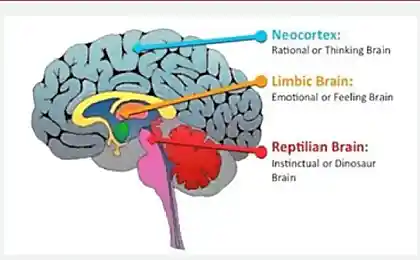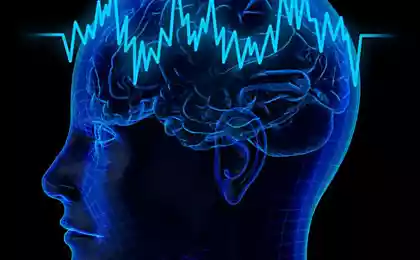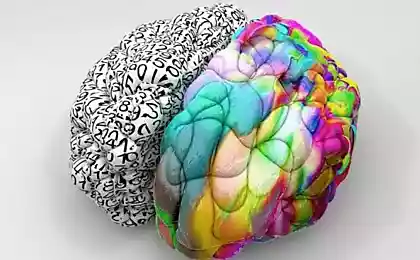656
Neurologist David Perlmutter: the work of our brain depends on the quality and quantity of sleep

When 48-year-old stockbroker Samuel came to see me one November evening, he asked me to "establish his health." With me it was not the first time, often approached me with such a General and slightly vague request. But I knew what he really wanted: Samuel wanted me to be imbued with his suffering and helped him the first time feel like a person, wholesome. It is a difficult task for any doctor. However bloated the face of the patient was something that instantly made me think of a possible problem. Having studied the history and main complaints, I found that Samuel suffered from reduced thyroid function and received certain medications. He said his life is full of stress, but the overall condition was rated as good. I had nothing to go on except past health problems, but suddenly the patient reported that his son was in infancy was marked sensitivity to solid foods, and later diagnosed with sensitivity to gluten. Starting to delve into the problem with the thyroid gland, I found that Samuel suffered from an autoimmune disease — Hashimoto's thyroiditis. The result further showed that he had a very high sensitivity to gluten: the level of only one of the 24 studied antibodies were within normal limits. Samuel was desperate for a diet without gluten.
Four months after he began to follow a diet, I got a letter from him, which involuntarily made me smile. Samuel admitted how miserable was the moment I decided to register to me in reception. Obviously, he was being disingenuous when he described his health with the word "good". Apparently, all was not well. He wrote: "Before I was diagnosed with a hypersensitivity to gluten, it seemed that I fall into the abyss... Despite the fact that I was a little over forty, I was haunted by a constant sense of lethargy. My mood changed in the blink of an eye, and I'm frustrated by little things. ...Now I'm back to being good old light-hearted man full energy, which is enough for the whole day. Now I sleep well at night, and the pain is gone. I am again unable to think clearly and not be distracted while working. But this is not the most pleasant: fat around my waist that I could not get rid of, in a literal sense melted away within two weeks."
Despite the fact that Samuel did not mention problems with sleep when I had first visit, I had the feeling that a good night's sleep has long bypassed his bedroom side. He looked exhausted. Many of my patients suffer from insomnia. For them it becomes so habitual condition that they forget what it means to sleep well at night until you have the pleasure to Wake up rested. Perhaps Samuel thought that healthy sleep is just a side effect of a diet containing gluten. But this is bigger. Many of us underestimate the benefit of sleep, but it's actually one of the most valuable in the life of the capital, which, first, goes to us for free, and secondly, it is vital for our well-being. In addition, sleep is the main tool in the fight against degenerative diseases of the brain, and you just have to know.
The scientific basis of dreams
Today, as never before, we understand the value of sleep from a scientific point of view. Preclinical and clinical studies have demonstrated that the function of almost all systems of the body — especially the brain — depends on the quality and quantity of sleep. Among the many proven advantages are its ability to regulate how much we eat, how fast is the metabolism, we get fat or lose weight, if you can fight off infections, how creative and insightful you can be, good or deal with stress, how quickly we can process information, obtain new knowledge, to organize memories and store them. Healthy sleep, which for most of us involves at least seven hours also has an effect on our genes.
In early 2013, British scientists found that lack of sleep in one week has changed the work of 711 genes, including those responsible for stress, inflammation, immunity and metabolism. Everything that has a negative impact on these important functions of the body, affects the brain. We depend on these genes because they provide a constant supply of proteins responsible for repairing damaged tissue. Despite the fact that we can't always see side effects of poor sleep on a genetic level, we certainly feel the signs of a chronic lack of: confusion, memory impairment, confusion, decreased immunity, obesity, cardiovascular disease, diabetes and depression. All these States are closely connected with the brain.
We already resigned to the fact that some of us refuse to sleep in favor of other needs of the body. Experts today focus not only on its quantity but on quality, that is, its ability to repair the brain. What is better: to have a good sleep for six hours or eight, but nervous? Maybe someone would think that such questions are easy to answer, and what do we know about sleep is all that is necessary. But science is still trying to figure out what impact it has on men and women. Just as I was writing this Chapter, was published a new study about the "amazing effects of sleep on appetite." As it turned out, the hormones affected by sleep deprivation differ in men and women. Although the outcome is the same for both sexes, the tendency to overeat, the underlying impulse for your hunger varies. As for men, lack of sleep leads to increased levels of ghrelin — a hormone which increases appetite. In women, the sleep deprivation does not affect ghrelin, but also reduces levels glucagonoma peptide-1 (ГПП1) — a hormone that suppresses the appetite. Of course, a fine line may seem insignificant, because in the end, we still come to the same outcome — we start to eat more, but this fact proves how bad we are aware of how the biochemistry of the organism in General reacts to the dream.
If we know anything about him for sure is the fact that with age, sleep becomes increasingly difficult. This fact is due to several reasons, many of which are associated with medical conditions that can compromise even the most sound sleep. 40% of people aged are deprived of sound sleep because of chronic problems like sleep apnea and insomnia.
The proven link between sleep disorders and cognitive decline. Christine Joffe, a psychiatrist at the University of California, is studying people at risk for the development of cognitive disorders and dementia. In my clinic, memory disorders, she found a common denominator and the most common complaints of patients — all of them hard to fall asleep and not Wake up during the night. Patients report that during the day they feel tired and have to take short breaks for sleep. When Joffe has conducted several studies analyzing five years more than 1,300 adults over the age of 75, she noted that people with impaired breathing during sleep or apnea likely to develop dementia over time twice. Patients suffering from violations of the natural lag, or those who often woke up in the night, were also at increased risk.
Daily biorhythm is the heart and soul of our prosperity. Already about six weeks of age we have produced a model of repeated activity associated with cycles of day and night, which is maintained throughout life. Like sunsets and sunrises, these rhythms repeat themselves about every twenty-four hours. We live in accordance with a variety of cycles, coinciding with 24chasovymi Sunny day: sleep cycle—Wake up to the established biological rhythms — increase and decrease in hormone levels, changes in body temperature and increase or decrease the amount of certain molecules that have a positive impact on our health. When our rhythm is not in tune with the twenty-four-hour solar day, we feel overwhelmed or tired: this is what happens at the moment when we are crossing time zones, forcing the body to adapt quickly to a new cycle.
The impression that many people do not realise how closely their biorhythm rooted in the habits associated with sleep, and to what extent it is controlled by the brain. The most obvious example is body temperature, which rises during the day, slightly reduced in the afternoon (hence the desire to take a break and sleep in the afternoon), reaching a peak by evening, and then decreases by night — and all this is a consequence of the activity of certain hormones in the body. The early morning temperature is at the lowest level, symbolizing the beginning of a new cycle. This is because levels of cortisol peak in the morning and throughout the day reduced. People who work shifts are at increased risk of developing serious diseases.
So, next time you feel unexplained fatigue, mood swings, hunger, thirst, retardation of thinking, memory problems, or even anxiety, aggression or agitation, think about how you sleep in last time to understand the true cause of this condition. Suffice it to say that we need reliable models of alternation of wakefulness and sleep to regulate hormones.
We focus on one of them, which almost everyone forgets, underestimating its importance, leptin. This is the permanent coordinator of the inflammatory response of the body, which is under the great influence of sleep and helps to understand do we need carbohydrates.
The thicker you are, the smaller the brain
The discovery of leptin that plagues the medical community and forever changed not only the view of the human body and its complex hormonal system, but also on the dream and its true value has undergone in 1994. Cost to assume that we have already studied all the hormones and their functions, as on the horizon appeared new, the existence of which had never suspected. Perhaps it is opening late for the reason that leptin has been found in the unusual location of the hormone in fat cells.
I have said that before the cells were to us nothing more than a camera, Packed with unnecessary calories, let's just say the reserves for a rainy day. But now it is known that adipose tissue is involved in physiological processes as intensively as other vital organs, and all this thanks to the leptin, which decides whether we will have eventually a big belly and, as a consequence, small brain. If to speak a simple language, leptin is a primitive survival tool. It is closely related to the coordination of metabolic, hormonal and behavioral responses in response to hunger. This hormone has a powerful effect on our emotions and behavior. Leptin is a kind of guardian, it is necessary to understand its structure and you will know exactly how to adjust the rest of the hormonal system, in order to learn how to skillfully manage
their health.
Despite the fact that leptin is in fat cells, it does not mean that it is bad. In excess amounts, it can actually lead to problems, such as degenerative disorders. But healthy levels leptin is able to prevent most diseases associated with aging, thereby prolonging the life. The higher your sensitivity to this critical hormone, the healthier you will be. Under sensitivity I can understand how your leptin receptors and use it. Nora Gedgaudas, a recognized expert in the field of dietetics, gives a brief definition of the leptin in the book "Primal body, primal mind": "Leptin controls the metabolism of mammals. Most people believe that this is the function of the thyroid gland, but in fact, it is leptin regulates metabolic rate. It is he who decides what to do with the fat: to make us feel the hunger and store fat or burn it. Leptin controls the inflammatory response and may coordinate the work of the nervous system. If any part of hormones tional system is not working properly, you will hardly be able to solve their problems until you take control the level of leptin".
The next time you put the fork and get up from the dinner table, say thank you to this hormone. When your stomach is full, fat cells release leptin to tell your brain the signal that it was time to stop. It's your brakes. This explains why people with low levels of leptin are prone to overeating.
A study in 2004, which is considered a landmark, showed that people with a 20% decrease in the level of leptin hunger and appetite were increased by 24%, due to what they ate foods high in calories and carbohydrates: sweets, salty snacks and foods containing starch. What was the reason for the decrease in leptin levels? The lack of sleep.
Have leptin and insulin have a lot in common, although they oppose each other. These are two proinflammatory molecules. By itself, the leptin — cytokine. It controls the creation of other inflammatory molecules in adipose tissue of the body. This explains why people suffering from overweight and obesity, exposed to different inflammations. Leptin and insulin is an important person in the managerial level of the organism, therefore, associated disorders usually go down in a spiral, causing severe damage to almost all systems, capturing even those that are not directly controlled by these hormones. But that's not all. For leptin and insulin are negatively affected by the same substances, and the worst their enemies — carbs. I already told you how insulin resistance occurs. Same story with leptin. When the body is overwhelmed and breaks down substances that cause permanent jump levels of leptin, leptin receptors begin to shut down and you develop a resistance to this substance. You're left alone with your body prone to diseases and all sorts of dysfunctions. Therefore, despite the fact that levels of leptin are elevated, it does not perform its main function: transmit signals to the brain that you have eaten. As a result, you can't stop and continue to eat. And that spells weight gain and obesity, with attendant risk of cerebral activity.
None of the world's known drugs are not able to normalize leptin levels. But healthy sleep and a healthy diet will certainly help.
Downside: ghrelin
Another associated with appetite hormone, which is worth mentioning before I continue my story, is ghrelin. They leptin like Yin and Yang. Ghrelin produced by the stomach when it is empty, thereby increasing the appetite. It sends the brain a signal that you need to eat. It is not surprising that the balance between leptin and Gmelina cause damage to your taste preferences and feeling of fullness, the ability to resist temptation in the kitchen, and so will hurt your waist. Studies have shown that levels of ghrelin in men have soared to the heavens in response to the violation of the sleep mode. This could cause increased appetite and the tendency to abuse of foods high in carbohydrates and low in nutrients which are easily converted into fat almost immediately after being hit in the mouth. When the hormones of appetite behave improperly, violated the relationship between the brain and the stomach. You mistakenly believe that hungry, receiving impulses that are hard to resist, relishing those products that just closed a vicious circle of fat formation, thereby increasing the risk of development of disorders and diseases of the brain.
Simply put, if you are unable to control hunger and appetite, we can only wish you good luck in managing blood chemistry, metabolism, waist size and, most importantly, the prospect of brain damage that is looming on the horizon. In the third week I developed a program I will ask you to focus on healthy sleep, so you can control the hormones that have a direct influence on the fate of your brain. And you don't have to resort to a variety of substances that help to fall asleep. The best sleep for your brain — natural. published
Excerpt from the book "Food and the brain" by neurologist David Perlmutter
Source: postnauka.ru/longreads/33817























